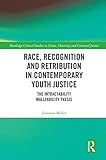Race, recognition and retribution in contemporary youth justice : the intractability malleability thesis / Esmorie Miller.
Material type: TextSeries: Routledge critical studies in crime, diversity and criminal justicePublisher: Abingdon, Oxon ; New York, NY : Routledge, 2022Description: 1 online resourceContent type:
TextSeries: Routledge critical studies in crime, diversity and criminal justicePublisher: Abingdon, Oxon ; New York, NY : Routledge, 2022Description: 1 online resourceContent type: - text
- computer
- online resource
- 9781351039468
- 1351039466
- 9781351039451
- 1351039458
- 9781351039437
- 1351039431
- 9781351039444
- 135103944X
- Race discrimination -- England
- Race discrimination -- Canada
- Minority youth -- England
- Minority youth -- Canada
- Criminal justice, Administration of -- England
- Criminal justice, Administration of -- Canada
- SOCIAL SCIENCE / Criminology
- SOCIAL SCIENCE / Ethnic Studies / General
- SOCIAL SCIENCE / Minority Studies
- 305.800942 23/eng/20211029
- HT1521
"Race, Recognition and Retribution in Contemporary Youth Justice provides a cross-national, socio-historical investigation of the legacy of racial discrimination which informs contemporary youth justice practice in Canada and England. The book links racial disparities in youth justice, especially exclusion from ideologies of care and notions of future citizenship, with historical practices of exclusion. Despite the logic of care found in both rehabilitative and retributive forms of youth justice, black inner-city youth remain excluded from lenience and social welfare considerations. This exclusion reflects a historical legacy of racial discrimination apparent in the harsher sanctions levied against black, inner-city youth. In exploring race's role in this arrangement, the book asks: to what extent were black youth excluded from historic considerations of the lenience and social care, built into the logic of youth justice in England and Canada? To what extent are the disproportionately high incarceration rates, for black, inner-city youth in the contemporary system, a reflection of a historic exclusion from considerations of lenience and social care? How might contemporary justice efforts be reoriented to explicitly prioritise considerations of lenience and social care ahead of penalty for black, inner-city youth? Examining the entrenched structural continuities of racial discrimination, the book draws on archival and interview data, with interviewees including professionals who work with inner-city youth. This recognition-centred lens prompts consideration of what contributes to the struggle these youth face, and explorations of the possibility that what they face reflects deficits in their relations of love, rights, and solidarity. The book argues that a truly progressive era of youth justice necessitates cultivating policy and practice which explicitly prioritises considerations of lenience and social care, ahead of reliance on penalty. This multidisciplinary book is valuable reading for academics and students researching criminology, sociology, politics, anthropology, critical race studies and history. It will also appeal to practitioners in the field of youth justice, policymakers and third sector organisations"-- Provided by publisher.
Introduction: Race, Recognition and Retribution in Contemporary Youth Justice, in England and Canada1.The Intractability, Malleability (I/M) Thesis: On the Historic Construction of Black, Racialized Youth as Intractably Deviant Outsiders2. Youth Justice Through a Historical Lens: On the Invention of the Intractable Deviant Black, Racialized Youth3. What⁰́₉s it all About Jose? The Invention of Black, Racialized Youth as Intractably Deviant Outsiders, in the English Context4. Educating Glovanna: Legislating Intractability and the Seeds of Black, Racialized Youth Outsider Status, in the Historic Canadian Education Framework5.Taking Stock of Contemporary Youth Justice: ⁰́₈The Alchemy of Race and Rights⁰́₉ in the Epoch of Punishment6. Intractability, Disproportionate Incarceration and the Self-Fulfilling Risk Policy Framework: The case of a Racialized Youth Gang7.The Wider Punitive Effect of Racialization: The Informal (Retributive) Gaze in Contemporary Youth Justice8. Conclusion
OCLC-licensed vendor bibliographic record.



There are no comments on this title.